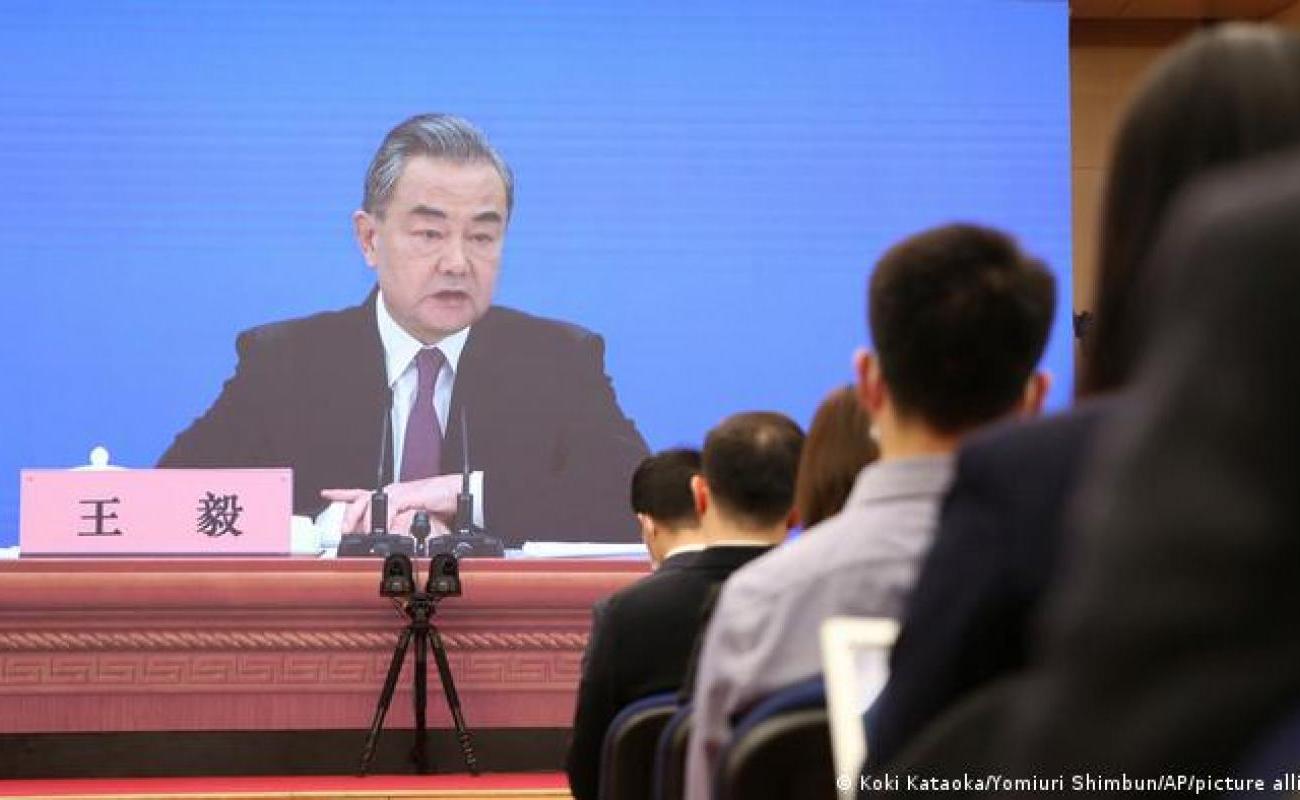Solidarity with Russia isolates China, but Si stands by Putin
The war in Ukraine did not shake the "boundless" friendship between Russia and China, even if Beijing seems to have had too much. The German agency dpa analyzes: how will Germany and Europe treat China now?

Despite the horrors of the Ukrainian war, China is completely behind Russia, even if it is positioned internationally. "No matter how treacherous the international storm, China and Russia will maintain their strategic determination and advance a comprehensive cooperative partnership in the new era." Chinese Foreign Minister Wang Yi commented on international sanctions against Russia on Monday (August 7th). "The friendship between the two peoples is strong."
The minister used the press conference during the session of the People's Congress in Beijing to convince Russia that he can still count on China. Their relationship is "one of the most important bilateral relations in the world", and that cooperation contributes to "peace and stability", Wang Yi said, as if the Russian war of aggression in Ukraine does not exist.
One of Xi Jinping's biggest mistakes?
Some observers who hoped China would somehow distance itself from Putin may have been disappointed. Wang Yi, widely praised in front of the press, confirmed the "boundless" friendship that the head of the Chinese state and the leader of the party Xi Jinping and the Russian president Vladimir Putin agreed at the meeting in Beijing on February 4.
Under pressure from the United States and the West, China itself is striving for that alliance, even if the costs of the invasion have unexpectedly increased. "Xi Jinping made probably one of the biggest foreign policy mistakes during his two terms by joining Putin on the eve of the Russian invasion," said China expert Judd Blanchett of the Washington-based Center for Strategic and International Studies (CSIS).
Beijing is in a dilemma: if Xi Jinping did not see that an invasion was being prepared, that does not speak well of his foreign policy skills. And if he doubted, and let it happen without doing anything, then the Chinese president is not in a great position either. Some indications are that this is a miscalculation, and not just the fact that Beijing hesitated for too long before asking about 6,000 of its compatriots in Ukraine to leave the country. Until the very end, Beijing rejected the American warnings about the upcoming invasion, assessing it as "incitement to war".
The Indo-Pacific version of NATO?
The severity of the sanctions, the unity of the otherwise divided democracies and the extremely high economic costs for Russia may have surprised Beijing? Unlike economically insignificant Russia, China, as the world's second-largest economy, depends on an open global trade and financial system. That is why Chinese banks were among the first to apply sanctions, so that they would not become a target on their own
In the UN Security Council, China did not condemn the invasion, but it abstained. The United States had hoped for a change of course: "The world is looking at which countries are committed to the principles of freedom, self-determination and sovereignty," US Secretary of State Anthony Blinken said during a telephone conversation with Wang Yi this weekend.
"China is constantly talking about the inviolability of the principle of sovereignty," Blinken later told CNN. With Russia now, however, there is one permanent member of the UN Security Council who violates that principle. "That is why we expect China to hear its voice. That vote counts. "
But the Chinese leadership refused to change course. The statement of the US Secretary of State, who accused her of wanting to build a defense alliance in the Asian region, shows how surrounded China feels: "The real goal of the Indo-Pacific strategy is to create an Indo-Pacific version of NATO."
China as a mediator?
The desperate hopes of Ukraine, but also of the EU High Representative for Foreign Affairs and Security Policy, Josep Borrell, that China will use its influence and intervene in any way, have failed. Wang Yi only promised that China would play a "constructive role".
The possibility of Beijing mediating is also rejected by Chinese experts: "If the West wants China to play a bigger role, it should first stop its malicious campaigns against China," Professor Zhu Feng from Nanjing University told the Global Times, which is close to the Chinese party.
With Xi Jinping standing by Putin so steadfastly, China continues to isolate itself. "China shot itself in the foot," said American expert on China Blanchett, pointing out that the front against China is growing in both Europe and the United States.
"The Russians have managed to completely change our Chinese policy in Europe," said Jerg Vutke, president of the EU Chamber of Commerce in China. He reckons with a stronger strategy of restraint by the United States, which Germans and other Europeans will not be able to avoid.
Wang Yi is well aware of this danger. As a precaution, he reminded Europeans that the volume of their trade with China has now reached 800 billion US dollars a year: "We hope that Europe will develop a more independent and objective perception of China." He hopes for a "pragmatic policy." Europeans should reject the "new cold war".
